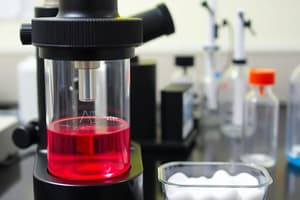Podcast
Questions and Answers
What role does the Folin-Ciocalteau reagent play in Lowry's assay?
What role does the Folin-Ciocalteau reagent play in Lowry's assay?
What is the main purpose of Lowry's assay?
What is the main purpose of Lowry's assay?
What feature of a sample is measured when using Lowry's assay?
What feature of a sample is measured when using Lowry's assay?
Which component is NOT part of the Folin-Ciocalteau reagent used in Lowry's assay?
Which component is NOT part of the Folin-Ciocalteau reagent used in Lowry's assay?
Signup and view all the answers
Which of the following samples could NOT be analyzed using Lowry's assay?
Which of the following samples could NOT be analyzed using Lowry's assay?
Signup and view all the answers
What is the key action needed to quantify protein content using Lowry's assay?
What is the key action needed to quantify protein content using Lowry's assay?
Signup and view all the answers
What was the purpose of using the assay in the study cited in the search results?
What was the purpose of using the assay in the study cited in the search results?
Signup and view all the answers
What is a characteristic of Lowry's assay?
What is a characteristic of Lowry's assay?
Signup and view all the answers
What is a common application of Lowry's assay?
What is a common application of Lowry's assay?
Signup and view all the answers
What is a component of the reagents used in Lowry's assay?
What is a component of the reagents used in Lowry's assay?
Signup and view all the answers
What is a benefit of using Lowry's assay?
What is a benefit of using Lowry's assay?
Signup and view all the answers
Study Notes
Lowry's Assay: A Classic Protein Measurement Method
Lowry's assay is a widely used protein measurement method that was developed in 1951 by O.H. Lowry and his colleagues at the University of Buffalo. It is a colorimetric assay that measures the total protein content in a sample by determining the amount of protein-bound copper ions, which then react with a Folin-Ciocalteau reagent to produce a blue-colored complex.
Methods and Materials
The Lowry assay is a straightforward method that involves several steps. First, a sample is mixed with a series of reagents, including bovine serum albumin (BSA) standards and a Folin-Ciocalteau reagent. The absorbance of the resulting solution is then measured at 750 nm using a spectrophotometer.
The assay utilizes several reagents, such as bovine serum albumin (BSA), sodium carbonate, sodium potassium tartarate, copper sulfate, and the Folin-Ciocalteau reagent. The Folin-Ciocalteau reagent itself is a mixture of sodium tungstate, sodium molybdate, orthophosphoric acid, concentrated hydrochloric acid, lithium sulphate, bromine water, and sodium hydroxide.
Applications and Interpretation
Lowry's assay is used to measure the total protein content in a variety of samples, from urine to microbial cultures. In the study cited in the search results, the assay was used to determine the levels of urinary peptides in patients with different levels of proteinuria. The researchers found that the levels of urinary peptides were significantly different between normoproteinuria, microproteinuria, and macroproteinuria cases.
The assay has also been used in other contexts, such as determining the protein content in rumen liquor and developing a method for protein measurement in the presence of Triton X-100.
Conclusion
Lowry's assay is a reliable and widely used method for measuring the total protein content in various types of samples. It is a colorimetric assay that utilizes a series of reagents, including bovine serum albumin (BSA) standards and a Folin-Ciocalteau reagent. The assay has been used in various fields, from clinical research to microbiology, and has proven to be a valuable tool for understanding protein content and its relationship to various physiological processes.
Studying That Suits You
Use AI to generate personalized quizzes and flashcards to suit your learning preferences.
Description
Test your knowledge about Lowry's assay, a classic protein measurement method developed in 1951 by O.H. Lowry. Learn about the steps involved in this colorimetric assay, the reagents used, and its applications in various fields.




